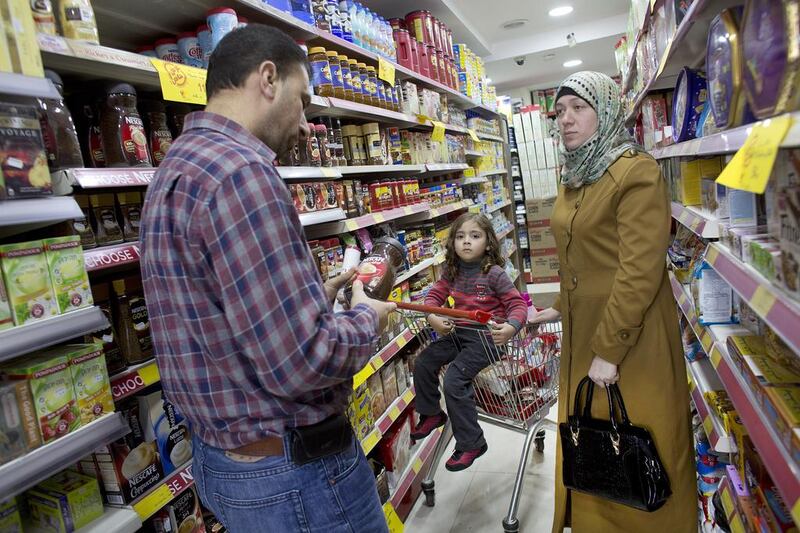RAMALLAH // The only Israeli products in Aziz Halawa’s supermarket are three small packets of butter and some gluten-free bread.
Instead of Israel’s widely marketed Zoglovek salami, he now sells only the Palestinian Siniora brand, from a company headquarted in Jericho.
The shopkeeper is participating in a Palestinian boycott of six Israeli food producers that is aimed at changing consumption practices in the occupied West Bank and reducing dependence on Israel. "The Israelis are our enemies and this is best for our economy," Mr Halawa told The National.
A month after the boycott launched, it appears to be seeing some success, but still faces challenges from those that prefer products from Israel.
A new non-governmental body, called the National Higher Committee, launched the boycott as retaliation for Israeli steps since January, including withholding tax revenues that the Palestinian Authority needs to pay its 155,000 employees.
The Israeli move was in response to the Palestinian bid to join the International Criminal Court, where the PA could pursue war crimes cases against the Israelis.
Since the West Bank comprises only a small market share for Israeli companies, it is doubtful that the boycott can inflict significant damage. Israeli foreign ministry spokesman Emanuel Nachshon called the boycott “counterproductive”.
Yet Palestinian organisers said the overwhelming majority of shops in the Ramallah area are co-operating with the effort. Many shop owners had already begun reducing their Israeli stocks during last summer’s war in the Gaza Strip and the boycott campaign has since accelerated the process.
“This is a for-profit place, but still we have social responsibility,” said Sa’ed Al Shini, a Ramallah supermarket manager, explaining his backing for the boycott.
The ban on the six Israeli brands named in the higher committee’s boycott call – Tnuva, which makes dairy products; Osem, which makes snacks and pasta; Prigat, which makes juice; Strauss, which makes ice cream; Elite, which makes wafers and candies, and Yafura, a beverage maker – was introduced gradually, according to Jafar Hemayel, an official from the ruling Fatah party, which is spearheading the campaign.
Leaflets were distributed calling for the boycott, there were discussions in schools and mosques, and meetings with individual shopkeepers.
The particular brands were chosen because their products would be easy for shops to replace with Palestinian or international brands, said Mr Hemayel.
“This is about raising awareness and by that I mean that when people look at a product they should see it as prohibited and understand that boycotting is a national, religious and moral duty. People should be aware that the money from these products turns into bullets killing our children.”
Last Thursday, Mr Hemayel and two other Fatah activists turned up at Mr Halawa’s store, near Ramallah’s Manara Square, to inspect whether he was complying with the boycott.
“We want to make a tour to be sure this store is abiding by the boycott,” said Mr Heymayel. So far, participation in the boycott has been voluntary, but Mr Heymayel said inspections might become weekly and a call could be made for Palestinians not to shop at stores that continue to sell the banned Israeli products.
Mr Halawa said the activists were welcome to inspect his shop. Three Tnuva butter packets were the only Israeli products among the store’s dairy selection. “We still have these left but we are waiting to finish them,” Mr Halawa said.
Mr Heymayal didn’t make an issue of the butter, saying that he would see in the next inspection if it was still there.
Wasel Abu Yusuf, a member of the PLO executive committee and key figure in the higher committee, said Palestinian activists would not be confiscating products from shop shelves.
“We don’t have legal backing to do that,” he said.
Instead the non-governmental effort relies on “patriotic feeling”, he said.
Mr Abu Yusuf said the boycott would be gradually expanded. “The aim is to target all Israeli products.”
But broadening the campaign is no simple matter since some consumers still favour Israeli products for their quality.
Away from the scrutiny of the Fatah activists, Malik Mohammed, 26, a grocery worker, said that some of his customers ask for Israeli products.
“There are some products Palestinians don’t make and sometimes people will tell you the Israeli product tastes better.”
He said that during the war in the Gaza Strip last summer, many people stopped buying the Israeli products but then afterwards went back to them.
“I think this will happen again,” he said.
Palestinian economists also say that reducing dependence on Israeli products, while necessary, will take time.
“This campaign has to consider questions of quality and price,” said Hisham Awartani, an economist at An-Najah University in Nablus. “The campaign must also persuade producers to improve the quality of their products.”
While, as a market economist, it was hard for him to say a boycott is a good thing, he agrees it is imperative to develop greater immunity to Israeli “blackmail” by encouraging local products and diversifying imports.
“There is a lot of room for substitution. We have to try harder,” he said.
foreign.desk@thenational.ae





